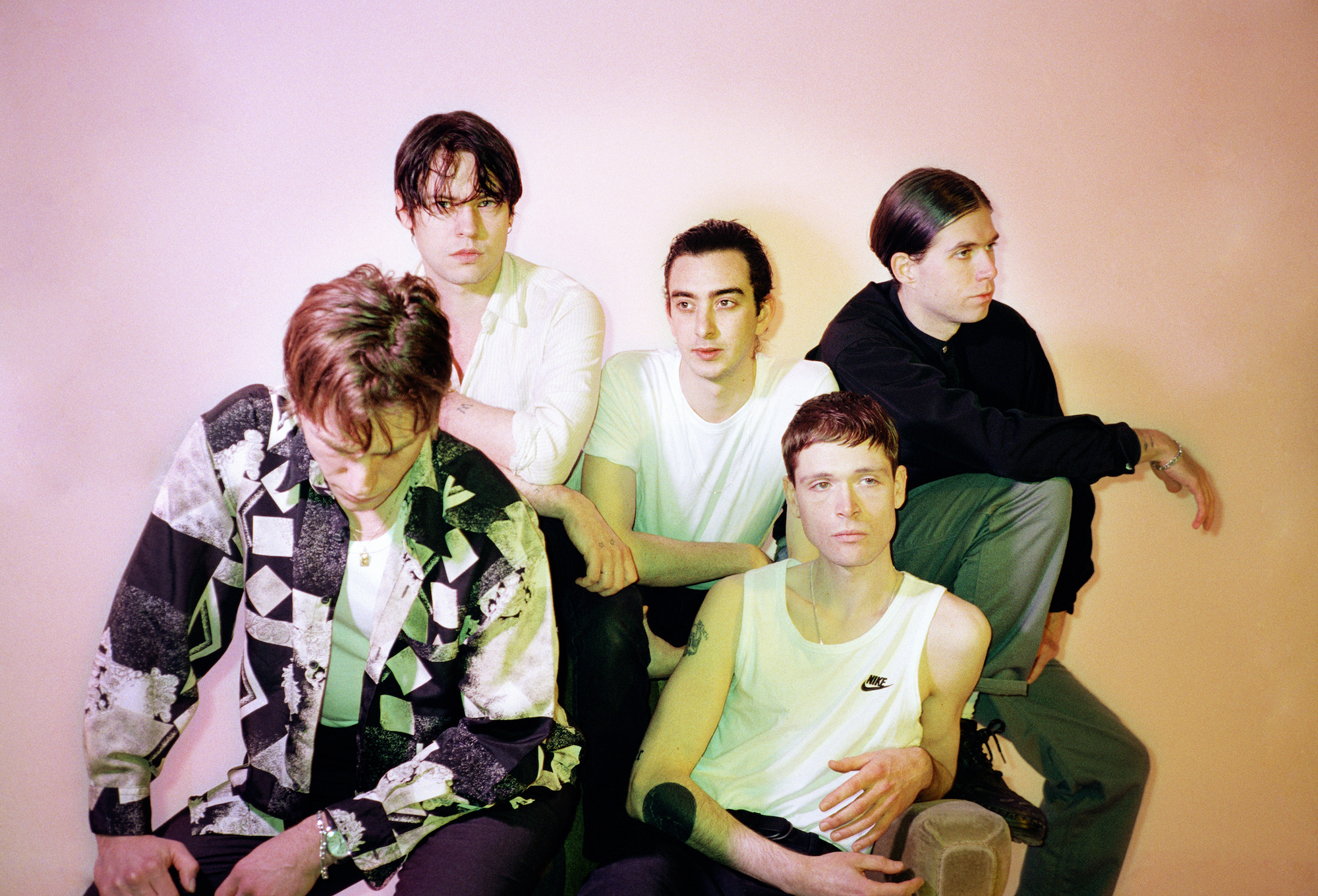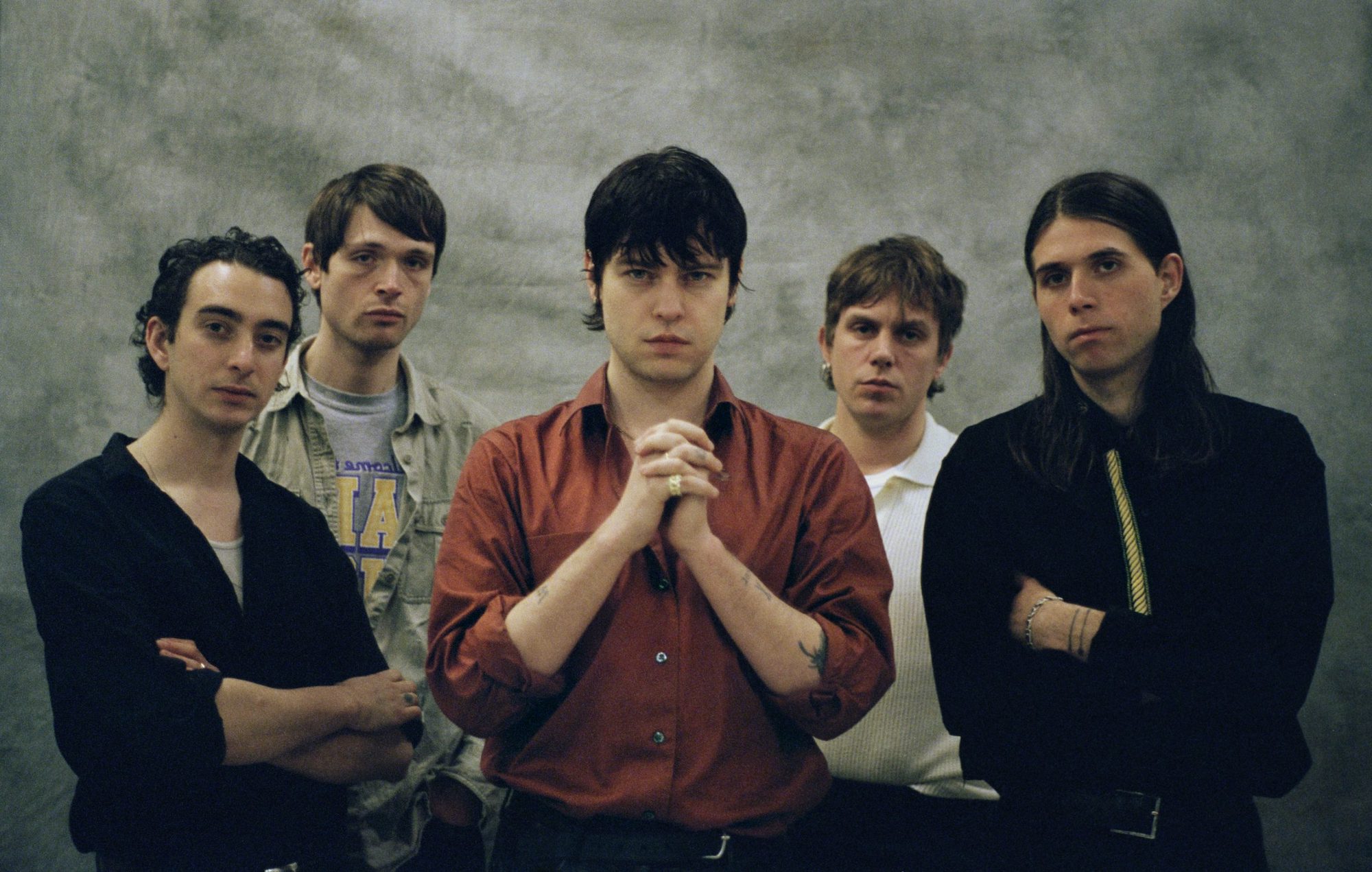In the late aughts of the Denmark music scene, nothing was really making worldwide waves. That is, until 2011, when post-punk outfit Iceage emerged from Copenhagen with their debut album, New Brigade: a loud, abrasive and slightly unsettling sound held together by Elias Bender Rønnenfelt’s echoing vocals.
Controversies followed, staining the band’s image in their early days — and leading to accusations of sympathizing with far-right ideologies. In a recent Pitchfork interview, Rønnenfelt vehemently affirmed that the band is “most definitely not right wing,” adding, “We don’t have any sympathy or leanings to that side.”
On top of that, Rønnenfelt belongs to the long tradition of interview frustration, devolvement, and general non-compliance — he was once dubbed “rock’s most difficult frontman” when it comes to dealing with the press, something for which he holds a special disdain and has openly detested, time and time again.
Knowing this made me a bit apprehensive about our FaceTime audio call. Yet Rønnenfelt was what could only be described as amiable and candid, but perhaps it was because I intercepted him on his Friday night in Copenhagen. After an obligatory apology for picking up on the fourth ring around, the muffled background commotion lessens as he steps away. He speaks with some strain and slur, falters when gathering a thought. A few minutes in, though, I was taken aback at how cooperative he was and how unresentful of my very belonging to the music press – opposite qualities I had been predisposed to.
Iceage’s fifth LP, Seek Shelter, was released May 7, and it’s their most eclectic yet. They haven’t so much exchanged their usage of power band instruments as they’ve sucked out all its potential and sent for strings, brass and a whole gospel choir to sufficiently translate their new effusion — and boy is it monumental. It’s an encompassing project that spans from vaudeville to Americana to psychedelia to histrionics to drunken singalongs, all while maintaining the stridency on which they were founded. It only goes to show that Iceage is anything but singular. They’ve undergone a total creative renovation with each album they put out and they aren’t letting up now.
SPIN: With the new record, the band entered into some uncharted territory for itself. It sounds less sinister and broody; at times, even lighthearted and there are even some slow songs. Some say you guys matured, whatever that means. So where did this shift come from?
Elias Bender Rønnenfelt: Fuck knows, I guess. But you mentioned more grown-up? I kind of hate that notion. If a little light has been allowed into the music and there’s a certain vulnerability for showing a degree of compassion, I hate that that automatically means that you matured somehow – that that should somehow mean that you arrived someplace. Maybe we come from a linear line of brooding. But I don’t think because there’s an element of nurture in the music that that sentiment [means] that you arrived someplace, that you achieved some kind of final, grown-up form. I think it’s just a broadening of palette rather than being some kind of individual that feels like “Okay, well now I’m seeing some sense of clarity,” because I haven’t.
Why did you include a choir in this album, and how was it working with one? Did you orchestrate the sound, or was it spontaneous in the studio?
Well, having done this for a bit, you write songs and you nurture and entertain ideas until they start to amalgamate into some kind of formation of songs that looks like an album, and, in our case, that means that they’re usually based around guitar, bass and drums. Then you start hearing things within that that’s not available to you. You start hearing sounds that aren’t there. A gospel-style choir seemed like a no-brainer. They came in, and I don’t have much technical knowledge — I’ve never worked with a choir before; I felt a bit scared to do it, honestly, and dumb. So they completely got it and just breathed a life into it. It felt like a natural conclusion to everything.
It’s a multi-layered, harmonic kind of thing, more than you can hum with your mouth, so it’s a trial and error kind of thing. Maybe I have an idea for a melody and they play that. But then you hear a whole orchestra inside your head, but you don’t know how to articulate that, so they’ll try something and you’ll be like, “No, that’s way too happy; make it more sinister.” Then you’ll be like, “That’s way too sinister; make it morose or make it more hungry.” You kind of have to speak in picturesque language up until you achieve something that’s akin to whatever’s going through your head.
It seems like you tune into all these different headspaces for this pretty variegated album. Are there certain headspaces you’re familiar with that you revisit to fish out a certain song you have in mind?
So far, all the compositions to an album have basically been written and I know which state entering the studio, and then I’ll take out 10 days, two weeks or whatever. Maybe I’ll go to another city, maybe I’ll borrow some kind of space within Copenhagen, and I’ll just sit down with it. Sitting with your notebook, you have all your troubles, your insights, your impressions or whatever you lived since the last album came by. That’s some kind of source material.
Maybe like in a case with “Drink Rain,” I’m not some sort of freak that lurks around at night drinking from dirty rain puddles in order to get closer to a girl I like or something, but that kind of deranged character can emerge from just sitting there. So you never really know what’s going to show up, but most of it tends to be rooted in whatever your mindset has been loosely flying around for the past year.

Yeah, the songs almost read like poems. Do you write poems then adapt them to be song lyrics or do you write songs to be sung?
Well, I’ve been writing poetry that’s not tied to songwriting. I started doing that like two years ago or something, but otherwise, no. I also don’t mix those together. I grab a notebook whenever I feel so inclined to it, and then songwriting is just whatever happens happens.
Have you ever considered publishing these poems?
I finished them, and it took fucking ages to edit that shit, but I was so tired at looking at it that I haven’t really been looking for a means to release it since I’ve finished it. So, uh… I don’t know. I think I’ll get ‘em out. I just can’t be fucked.
Do you have any favorite poets?
I mean, yeah, there’s things that spring to mind that I’d rather not mention almost. I actually hated poetry for most of my life, going to high school before I dropped out. I thought poetry was such a dirty, cheap way of writing because in school you were forced to. Well, you got some kind of vague poem, and then the teacher would bring it onto you to read everything into it. And it’s like, “Okay, I’m doing all the work here,” and I just found it to be a lazy man’s literature.
But God, was I wrong. I later found it to be such a beautiful thing, and how it flows through you can actually alter the way you feel very much the same way that a song plays out. A song you just push play on, and it floats through the air and you feel a different type of way. I think poems can work the same way. So, yeah, I was wrong.
So what’s the difference, you think, then, between a song and a poem?
One has music, and the other one don’t. [Laughs.] I mean, it’s fucking obvious, isn’t it?
Yeah, yeah. [Laughs.] I meant strictly in terms of written form. Would you write something different for a poem as opposed for a song?
That’s the thing I found really difficult because I realized that everything I ever really put actual effort into writing was lyrics, and I often felt restrained in lyric form because you have your verses; you have your choruses; you know how many lines are going to be there; you know they have to fit into punctuation. So, you’re in a sense, filling out the blanks. Of course it’s not as tied-down as that, but you know what I mean. But when I then started taking the writing seriously outside of lyric form, you’re suddenly without any framework at all. So that means that there’s no boundaries as to when things stop or start, and when things are open and you’re left with infinite options, that’s so much more difficult than when you actually have a set of restraint to yourself. So in a sense I’ve found it much more difficult. Because who knows when it does its job?
Your lyrics are steeped in symbolism, and the music videos are littered with symbolism. The band has its own icon. What is the purpose of using symbols?
We have a tendency to reach toward archetypes or stories, and I think that it’s something in my making sense of mundanity, in the same sense that there is an urge to reach for those kinds of comparisons. It’s like falling in love. Falling in love is mundane. It doesn’t mean anything. It’s arbitrary; it’s common. It’s, in the grand scheme of things, of no matter whatsoever. But yet somehow, every friend I ever had – you know, like when they’re in heartache – it means everything to them. It is the single most important thing. So we want to reach to almost biblical proportions to make sense of what is in the end completely normal. With the songwriting, I make more sense of mundane emotion if I can reach towards things that aren’t mundane.
I read somewhere that you said you were fascinated or interested by crime, and the lyrics and music video for “Vendetta” smack of it. So what is it about crime that you find so fascinating? How does it find a place in Iceage?
I think crime is so near everybody, and a lot of fucking people don’t have a clue really. A lot of people grow up in a sense that they don’t even see that it’s staring at them in the back. And I think as much as you engage yourself in politics or whatever side of politics you’re presented with, crime is just an ever-present glue that holds everything together. It doesn’t matter what layer of society you’re in. But it’s ever-present, and it’s ironic in the sense that the law that punishes crime is the same that breaks it all the same. I’ve grown up seeing crime everywhere. I go venture the world, and it’s just there, just below the surface. You don’t have to scratch very hard to find it. It’s something to talk about.





